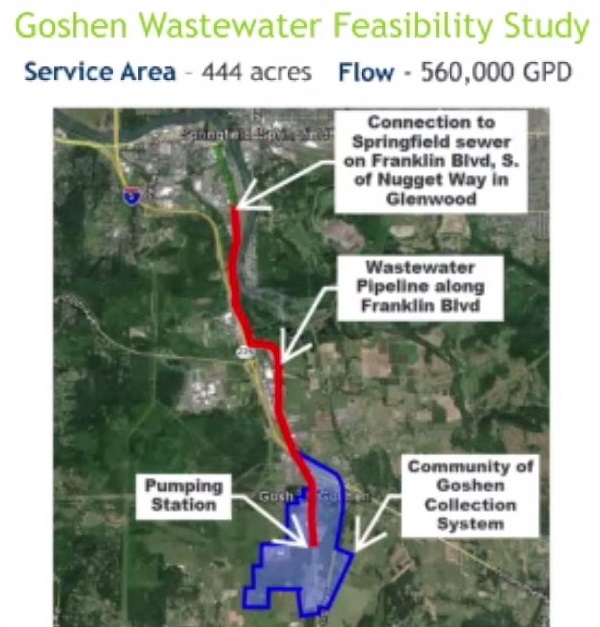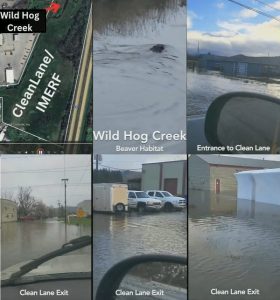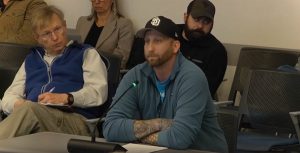Wastewater commission asked to ‘show the math’ for Goshen service costs
8 min read
The Metropolitan Wastewater Management Commission will seek approval this fall to connect to the Short Mountain landfill and Goshen. With an update at the MWMC meeting April 14, Executive Officer Matt Stouder:
[00:00:13] Matt Stouder: With respect to Goshen: We had a good meeting with (the city) council of Eugene. Dan Hurley and the county staff presented to them; in conversation with council, I got called to the table and asked some input from MWMC’s perspective.
[00:00:26] John Q: Here’s some of the discussion from that work session, held March 15.
[00:00:30] Dan Hurley (Lane County Public Works): My name is Dan Hurley. I’m the Public Works Director at Lane County. I’m here to talk about the Goshen Wastewater Project. This is a proposed infrastructure project that ties to a regionally significant economic development project, really just focusing in on Goshen and the Short Mountain landfill.
[00:00:46] Goshen is significant in that it is a large contiguous area already zoned as industrial land—233 acres of general industrial and another 83 acres there of light industrial. There are some regulatory barriers. There’s also an inadequate sewer infrastructure. The properties are currently just being served by septic systems, not appropriate for advancing larger industries.
[00:01:08] Zoning ordinances were enacted to address barriers. This took us through obtaining a Goal 14 exception. The Land Use Board of Appeals (LUBA) required the county to show feasibility for the area.
[00:01:19] So we then went into a wastewater feasibility study, to be able to address that LUBA remand. We looked at a number of different options for providing wastewater service.
[00:01:29] We looked at a lagoon option, similar to Lane Community College. Those are challenging environmentally. We looked at a system just for Goshen, but just economies of scale, that’s very expensive to have an independent wastewater treatment facility for something of this scale.
[00:01:45] It was found that the most economical, the most benefits, environmentally, cost-wise, would be to tie into the existing regional facility MWMC that serves the Eugene-Springfield area.
[00:01:57] We’re at a point where we’d like to see this move towards getting shovel-ready so that we could potentially get to completion on this project.
[00:02:03] So I’ll pass now to Rob Woodard. He’s our special districts project manager. He’ll give you a quick overview of the proposed route for the sewer line.
[00:02:11] Rob Woodard: Okay. So the tap is in Springfield and it comes down; it’s in the Franklin Boulevard and Nugget Way area. And so what we’ll do is we’ll tap the existing system, run a force main along Highway 99 down into the Goshen area along with four pump stations. It’s approximately 17,000 linear feet of sanitary sewer, 18-inch connection on the sewer on Franklin Boulevard. The service area is approximately 444 acres, and the flow of the system at full build out will be 560,000 gallons per day.
[00:02:46] The other segment of this project was the Short Mountain landfill extension. Currently the leachate that comes out of that is 76,000 gallons per day and it is trucked 6.25 miles. So by connecting to this transfer station, we can eliminate all the things that come out of that effort for trucking.
[00:03:06] Dan Hurley: Thanks Rob. So what’s called leachate, it’s the wastewater coming out of the landfill. That’s, you know, all the rainwater, there’s the water in the garbage that kind of percolates through the landfill and it’s contained in a cell. That has to be treated. And we looked at running a sewer line in the late ‘90s, and that didn’t move forward.
[00:03:25] And so since then, for 24 years now, we’ve been trucking this wastewater leachate. So we’ve traveled over a million miles with these trucks and it’s quite an operation. We’d love to get those trucks off the road. They produce carbon emissions to the tune of over 600 metric ton CO2 equivalent.
[00:03:42] So we’ve worked through some estimated costs, so about $14.4 million for the construction costs and up to $25.4 million for the total project costs.
[00:03:53] It’s a significant project in that it could increase economic vitality for the region, quite a number of large properties, and the Lane County Board (of Commissioners) has been interested in trying to facilitate, with the proximity to the landfill, the potential for a material recovery facility, some green, green industries, circular-economy-type concepts that could play out in Goshen with some incentives there.
[00:04:15] You have a world-class wastewater treatment facility here that has been nationally recognized for its use of biosolids and is exploring innovative things such as recycled wastewater. It would be great to be able to tap into that terrific system that’s already there, rather than trying to build a cost-prohibitive system to do that, which would serve Goshen, and in total at full buildout would account for less than 2% of the existing flows coming into the system.
[00:04:39] It’s our intent that this would be of no cost to the existing ratepayers, that development would pay its way. We would need to work with MWMC to figure out what would be the buy-in cost, what’s appropriate for the use of the existing system, and what would be the connection charges for developments as they come in and would plan to keep working on that before we return to you in the fall.
[00:05:02] Councilor Jennifer Yeh: As you know, I serve on the Metropolitan Wastewater Management Commission. And commissioners have come to the conclusion that this is the direction that makes a lot of sense, I think, especially for the Short Mountain landfill. Trucking the waste is just not a long-term thing we want to be doing. We shouldn’t have been doing it for this long, but this is where we were, right? And this fix will make our community safer. As you have said, we do have a world-class facility, I think something we should all be very proud of. And also I just want to make sure that everyone knows we also have the same concerns around ratepayers and making sure we’re being responsible to the people that we serve.
[00:05:42] Councilor Mike Clark: I think it’s a fantastic idea. I’m strongly in support. This council’s about to embark on work with a West Eugene overlay zone where we have a long-standing challenge, I think, to get adequate heavy industry and manufacturing into our area that benefits us, without it being too close to a lot of people’s homes.
[00:06:04] And I think this provides yet another opportunity for us to create a fairly large-scale opportunity for industry. And at the same time, it’s not overly close to so many people’s residential areas that it creates any kind of health risk.
[00:06:22] So to the extent that we can get Goshen up and going as an opportunity to put agricultural products on rail all the way to Seattle and be able to sell them internationally, there’s a lot of wheat farmers around here who would like to see that take place, and save on the transportation costs.
[00:06:38] So I think the quicker we get Goshen ready, the better off it will be for all of us and I’m very strongly in support.
[00:06:46] John Q: A question from Councilor Alan Zelenka.
[00:06:49] Councilor Alan Zelenka: My main concern about all of this is the violation of the UGB (urban growth boundary). I mean, the whole point of having an urban growth boundary is so you don’t have external non-compact urban growth. So one of the questions I had is related to the way that this gets done.
[00:07:04] The estimated total project costs nearly double because of the hookup cost, and I’m wondering if the Goshen area is going to be free riders on a system that we all paid for by not having to pay those hookup fees. I’m wondering how that gets addressed.
[00:07:20] Dan Hurley (Lane County Public Works): Councilor, our intent is that they wouldn’t be free riders, that there would be a buy-in cost that would be proportional to the capacity that this would be taking up in the existing infrastructure.
[00:07:30] And Matt can probably talk more about this. We, with the previous studies, we did propose a couple different ways that this buy-in could work and we need to work through which would be the most desired by MWMC.
[00:07:43] And so those conversations still need to be had and arrive at a specific dollar amount on those. But the intent wouldn’t be a free ride on that.
[00:07:52] Councilor Alan Zelenka: Maybe you can answer the question of why there’s a buy-in cost.
[00:07:55] Matt Stouder: Matt Stouder, MWMC executive officer. We want to make sure that we protect the investment from the existing users that have already in essence purchased all the facilities that we have.
[00:08:06] Councilor Alan Zelenka: So people have to buy into the system that everybody else already paid for, ‘cause there’s capacity that they need to then pay.
[00:08:12] Matt Stouder: Correct. We want to protect the capacity investment that’s remaining for the two cities, as well as the existing investment that the users have paid for.
[00:08:19] Councilor Alan Zelenka: Because if we just let someone pay the wastewater fee, without the buy-in cost, then they would not pay for any of that infrastructure that got built. So the buy-in cost is a way of recouping the investment that everybody else already made. (Correct). Okay.
[00:08:30] Well, how that gets done is really quite an important thing. And my main concern here is about making sure that there’s no subsidy going to the Goshen Industrial Place. So could you guys get us a memo that shows that subsidy doesn’t occur, how do we prevent, as you said, no increased cost to existing ratepayers, and show the math? That would be very helpful, including the hookup costs.
[00:08:54] John Q: With an update April 14 for the MWMC, Executive Director Matt Stouder:
[00:09:00] Matt Stouder (MWMC executive director): The joint planning commission meetings have occurred and public record’s been held open and they’re trying to satisfy the findings associated with the planning goals. I think that’ll happen probably prior to our next meeting.
[00:09:11] We have a session with the Springfield council on May 8, and so we’ll be discussing the same thing with them, where we’re at to date and what the next steps look like moving forward. There have been some concerns expressed by the Eugene council and we anticipate they’ll be expressed by Springfield council.
[00:09:25] And the county staff actually has reached out to me and wants to schedule a meeting to talk about the terms of updating MWMC’s IGA (inter-governmental agreement) and financials and some of the other things.
[00:09:39] And I think they’re seeing that in order to do a Metro Plan amendment, they’re going to need to be advancing the IGA conversation with the finance conversation as well, because that’s where the elected officials have stated their comfort level is.
[00:09:46] The policymakers have expressed, at least initially, that they’d like to have comfort that the analysis has been done, that there’s not going to be an impact in the existing ratepayers and cities, frankly, with respect to future reserves before they’re going to be comfortable approving the Metro Plan.
[00:10:02] And that’s where I think it’s a chicken-and-egg thing, but these are going to have to start moving forward.
[00:10:06] John Q: Eugene, Springfield, Lane County, and the regional wastewater commission discuss infrastructure for Goshen industry, and an end to trucking wastewater from Short Mountain. A decision could be made this fall.





